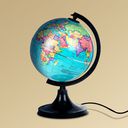Biden puts trade back on the radar with Indo-Pacific talks

President Biden is putting Asian economies at the center of a new economic accord, at a time when globalization has become anathema, and geopolitical tensions are reshaping the world order.
Why it matters: Regional heavyweights like India, Australia, Japan, and South Korea are linchpins in the Indo-Pacific Economic Framework (IPEF), which (at least for now) has pointedly excluded China.
- The administration is seeking new regional alliances and fortifying old ones, but those ambitions face an uphill climb.
By the numbers: Two-way trade between the U.S. and the region totaled $1.75 trillion in 2020, according to White House estimates, with American foreign direct investment just shy of $1 trillion.
- The other side: According to the Center for Strategic International Studies (CSIS), some constituents are worried about the “optics” of not including Beijing.
- Even worse, “partners in the region remain perplexed over what the IPEF is and what it seeks to do,” the CSIS wrote in a recent analysis.
The big picture: The bilateral U.S-China relationship is tense for a number of reasons, with grievances over trade and technology topping the list.
- The new framework is designed in part to cultivate new allies, and counterbalance China, but it's already coming under bipartisan fire for being insufficiently clear or ambitious.
What they’re saying: Trade isn’t just about the flow of goods and services anymore. In a global economy increasingly reliant on advanced technology, Biden has an opportunity to craft rules “based on safety, security, and transparency, argues IBM vice chair Gary Cohn.
- In an opinion piece shared with Axios, the ex-Goldman Sachs banker turned White House economist called the framework “a good start” that needs more muscle – and a laser-focus on data security and intellectual property.
- “Without the certainty of clear, legal obligations, countries will be free to ignore its elements on a whim as different governing constituencies come to power,” he added.
Yes, but: Some Asian economies are concerned efforts will only involve “the usual suspects” while excluding other key countries.
- “These partners view the success of the IPEF as hinging on the extent to which the United States can attract developing countries from Southeast Asia, South Asia, and the Pacific,” the CSIS said.
The bottom line: Asia is strategically critical, America needs all the friends in the region it can get, and many countries are committed in principle. But a flawed rollout may spoil the IPEF's chances before it even begins.